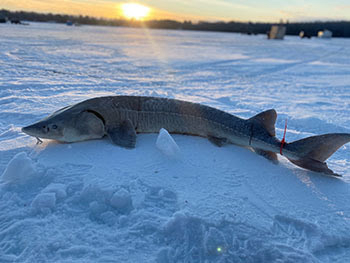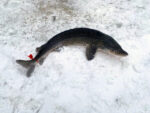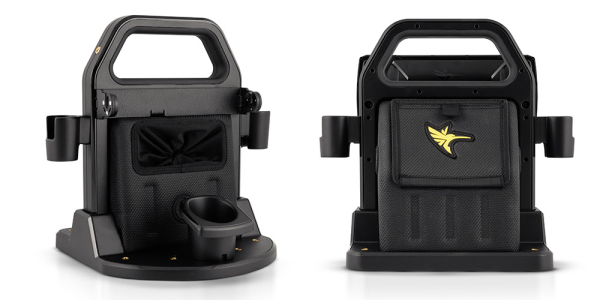Black Lake sturgeon season results announced

Once again the 2017 Black Lake sturgeon season in Cheboygan County, Michigan, was a quick one, lasting just over an hour. The Department of Natural Resources announced the results of this year’s season, with the recreational harvest limit of seven fish being attained, along with the additional harvest of one fish.
The fishing season, which includes spearing and hook-and-line fishing, was scheduled for Saturday, Feb. 4, through Wednesday, Feb. 8, or until the harvest quota had been reached.
Based on quick communications from on-ice personnel, the sturgeon fishing hotline was updated at 9:07 a.m. DNR law enforcement officials and other department personnel were embedded in the on-ice fishing communities and were able to quickly report harvested fish, as well as to quickly contact lake sturgeon anglers on the ice and close the season.
There were 332 registered anglers on the ice Saturday, up from 261 in 2016. Angler registration since 2010 has ranged from 197 to 332. Most anglers pre-registered Friday, Feb. 3, allowing for a more streamlined process.
“There was a small flurry of activity towards the end of the season and following an investigation by the on-ice conservation officers it was determined the last few fish were all harvested at the same time,” said DNR fisheries biologist Tim Cwalinski.
According to the DNR, six female and two male lake sturgeon were harvested. The females ranged in length from 55 inches to 67 inches and 33 pounds to 79 pounds. The two males were 46 inches and 59 inches and weighed 14 pounds and 42 pounds, respectively.
Six of the eight fish had some sort of identifiable tag from previous years, providing the DNR with valuable information regarding spawning regularity and fish growth. For example, fish number three, which was 63 inches long, was initially captured by the DNR and Michigan State University researchers and tagged in the 2001 spring spawning run, at which time it was 62 inches long. This fish, a female, also was captured in the 2004 and 2015 spawning runs. The DNR keeps information like this for each fish encountered during a spawning run or in survey efforts.
“It is unfortunate the allocation quota was breached, but our very low harvest quota acts as a buffer to such events. For instance, since the open registration season started in 2010, the state of Michigan has been allocated 52 fish for harvest, while 50 fish have actually been harvested,” said Cwalinski. “We are trying to balance the goal of accommodating increased angler participation with the need to be protective of the population.”
The DNR uses a model that takes into account harvest from a given year and population data to produce a harvest quota for the following year.
The DNR continues to provide an open fishery for lake sturgeon while still recovering the species to full status in the Black Lake watershed. The state’s current harvest rate of 1.2 percent of the population is a safeguard against over-harvest. This is a rate that has been agreed on in the past with tribal governments. In addition, annual stocking and protection of adults in the river during spawning help to keep building the population.
Rehabilitation of lake sturgeon in the Cheboygan River watershed is a cooperative effort involving the DNR, the Black Lake Chapter of Sturgeon For Tomorrow, Michigan State University, Tower-Kleber Limited Partnership, the Bay Mills Indian Community, the Grand Traverse Band of Ottawa and Chippewa Indians, the Little River Band of Ottawa Indians, the Little Traverse Bay Band of Odawa Indians and the Sault Ste. Marie Tribe of Chippewa Indians.
For more information on lake sturgeon in Michigan, visit Michigan.gov/sturgeon.






